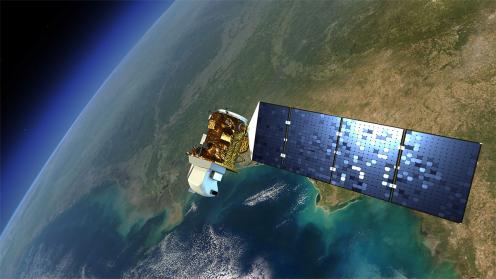On Tuesday afternoon, GEO Week 2021 continued with the official opening of the Seventeenth Plenary Session of the Group on Earth Observations (GEO-17). Participants heard presentations on the GEO Work Programme activities and contributions to global policy frameworks, specifically the Minamata Convention on Mercury, the Ramsar Convention on Wetlands, and the UN 2030 Agenda for Sustainable Development. Taking place before the plenary session, the GEO Industry Track focused on partnerships for promoting Earth observations. It featured two engaging panel sessions on public private partnerships and on finance, as well as presentations by seven small, medium and micro-sized enterprises (SMMEs) regarding their work on Earth observations.
Opening GEO-17, GEO Co-Chair Zhang Guangjun, China, reported on GEO China’s Disaster Data Response Mechanism, which has been activated to provide countries with high-resolution satellite imagery in support of disaster response planning. He cited the example of support to the Thai Flood Disaster Response through satellite post-disaster data.
GEO Co-Chair Mmboneni Muofhe, South Africa, lauded GEO’s efforts in strengthening regional work, welcoming the selection of the South African National Space Agency (SANSA) as host of the Digital Earth Africa Program Management Office. This, he said, marks a significant milestone in ensuring the needs, challenges, and priorities of the continent are met through reliable access to Earth observations data.
GEO Co-Chair Stephen Volz, US, highlighted increased recognition of GEO’s ability to provide good data to meet the objectives of the 2030 Agenda for Sustainable Development, the Paris Agreement, and the Sendai Framework for Disaster Risk Reduction.
Yana Gevorgyan, Director, GEO Secretariat, highlighted the involvement of GEO at UNFCCC COP 26, where for the first time in 14 years, GEO was recognized by an international treaty for its role in providing Earth observations data. She also mentioned the need for increased engagement with GEO members to deliver against global environmental and socioeconomic needs via Earth observations.
GEO Lead Co-Chair for 2021, Joanna Drake, European Commission, praised GEO members for progress in strengthening engagement with UN bodies. She urged ensuring relevance and outreach of GEO activities and data noting that the “Eyes on the Earth” has not yet reached its potential and should play a more active role in, for instance, supporting the post-2020 global biodiversity framework. She also strongly supported the work on Equality, Diversity and Inclusion, and applauded the first ever Youth Track at GEO.
Participants also heard presentations on how activities in the GEO Work Programme are supporting global policy frameworks. Nicola Pirrone, Research Director, National Research Council, Italy, highlighted the Global Observation System for Mercury (GOS4M), a GEO flagship programme aimed at supporting the Minamata Convention on Mercury Secretariat, the UN Environment Mercury Air Transport and Fate Research Partnership, and countries in evaluating the effectiveness of the Convention.
Sarah Barsotti, Icelandic Meteorological Office, highlighted the successful experience of using observational data for volcanic civil protection. She explained that civil protection authorities in Iceland have collaborated with the scientific community for the past few decades through a Scientific Advisory Board.
Amir Givati, Chief Science Officer, EnviroManager, Israel, discussed the GEO Global Water Sustainability (GEOGloWS) Initiative and how hydrological data and forecasts from the initiative enable the region to anticipate extreme weather events and take appropriate action, notably providing data as an independent body. Lisa Maria Rebelo, Vice Chair, Scientific and Technical Review Panel, Ramsar Convention on Wetlands, highlighted the potential for Earth observations to contribute to the preservation of wetlands and underlined the importance of the GEO-Wetlands Initiative. She discussed possibilities for strengthening Nationally Determined Contributions for climate by including wetlands.
Following the plenary discussions, participants gathered in two anchor sessions. The first session on “Integrated implementation of GEO work programme activities,” was moderated by Sean de Cleene, Member of the Executive Committee, World Economic Forum. It considered the importance of integration, synergies, and cooperation for implementation of the GEO Work Programme.
The second session, on climate action, was moderated by Robert Bradburne, Deputy Chief Scientific Adviser, Department for Environment, Food and Rural Affairs (Defra), UK. This session considered how Earth observations can strengthen decisions by governments and international financial institutions on climate-friendly investments in the context of the Paris Agreement.
Industry Track
The Industry Track focused on partnerships in the Earth observations sector, during its second and final day of deliberations, with speakers discussing public-private partnerships and providing examples of business models. In a panel on “Investment and venturing in the downstream space value chain,” speakers discussed financing challenges faced by new space companies and how to overcome them. Devon Govender, CEO, Lion Pride Investment Holdings, explained that investment companies are generally unwilling to take on market risk and said founders must do proper research to ensure the market viability of their products. He highlighted they can do this by defining their hypothesis, developing “minimum viable tests,” and testing these in the market.
To receive free coverage of global environmental events delivered to your inbox, subscribe to the ENB Update newsletter.



























